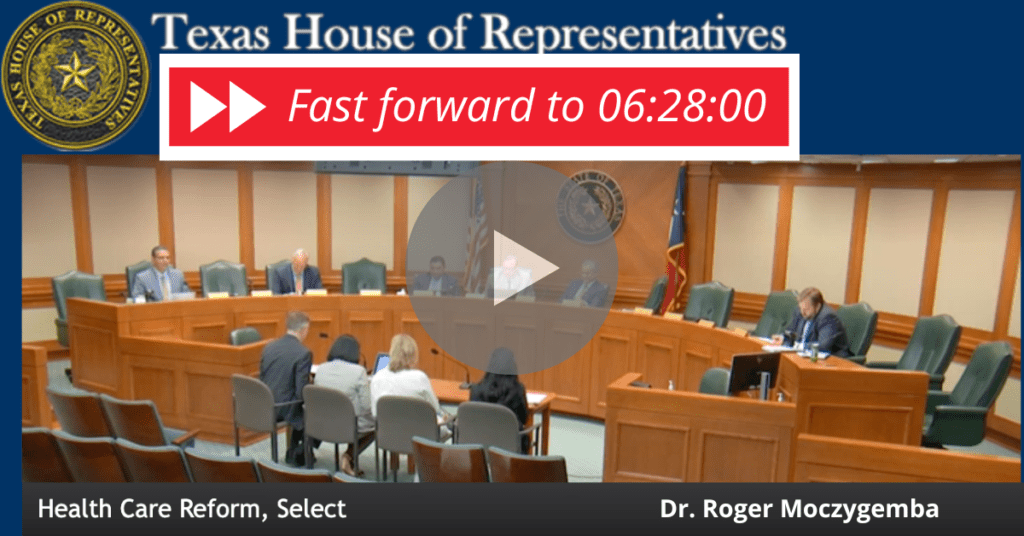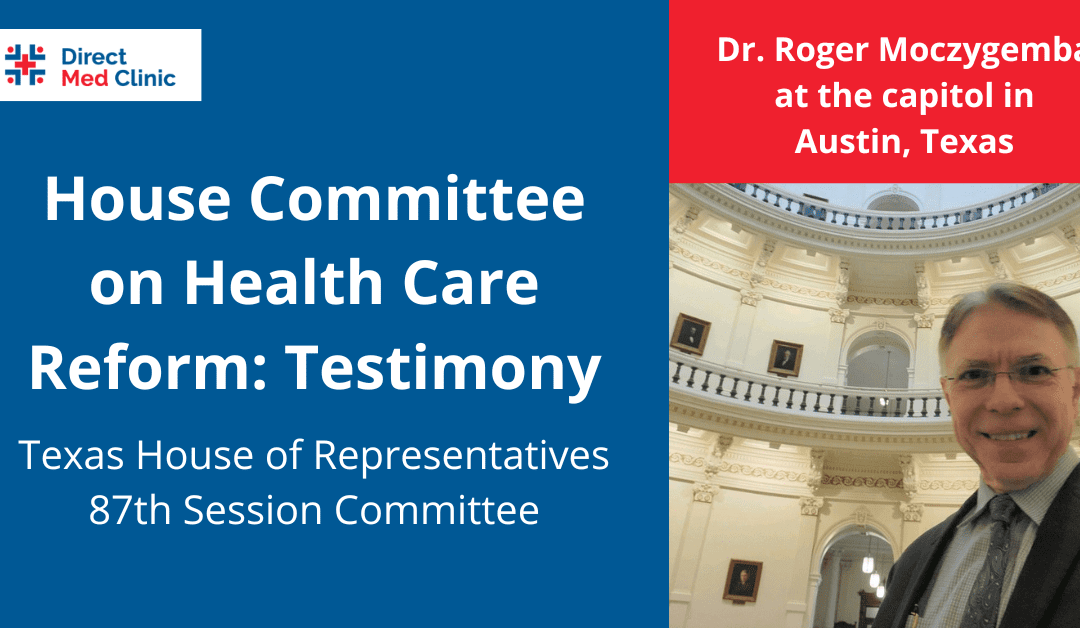On August 5, 2022, Dr. Roger Moczygemba went to the state capitol in Austin, Texas, where he had the opportunity to testify on access to care that is direct, accessible, transparent, and affordable. “I am so thankful for my whole Direct Med Clinic team for helping to provide a place where healthcare consumers and employers can access affordable care.”
For the rest of Dr. Moczygemba’s testimony, you can watch below. Fast forward to 6 hours and 28 minutes. Yes, we know it was a long session! 🙂

Read the Proclamation for the Health Care Reform
PROCLAMATION
CREATION OF HOUSE SELECT COMMITTEE ON
HEALTH CARE REFORM
Pursuant to Rule 1, Section 16(b), Rules of the House of Representatives, I, Dade Phelan, Speaker of the House of Representatives, hereby create the House Select Committee on Health Care Reform.
SECTION 1. MEMBERSHIP, AUTHORITY, AND DURATION. The committee shall have 11 members and shall have the same authority and duties conferred on standing committees under the Rules of the House of Representatives. The committee expires on the date the 88th Legislature convenes.
The following members are hereby appointed to the House Select Committee on Health Care Reform:
Sam Harless, Chair Toni Rose, Vice-Chair Greg Bonnen John Bucy Giovanni Capriglione
James Frank
R. D. “Bobby” Guerra Stephanie Klick John Lujan Tom Oliverson Armando Walle
(1)
Stud
SECTION 2. DUTIES The committee is created to provide a cross-jurisdictional forum for the examination and consideration of issues that broadly affect the state’s health care delivery system. The committee shall:
Study the implications of excessive health care costs on the efficacy of Texas Medicaid and the private health insurance market and the resulting impact on individual Texans, businesses, and state government. Specifically, the committee shall:
Examine the interaction of specific factors of health care affordability such as transparency, competition, and patient incentives. Make recommendations to expand access to health care price information to allow consumers to make informed decisions regarding their care; Examine the impact of government benefit, administrative, and contractual mandates imposed upon private insurance companies and their impact on employer and consumer premiums and out-of-pocket costs, including the effects of specific benefit and any-willing-provider requirements. Make recommendations for state and agency level mandates and regulations that could be relaxed or repealed to increase the availability and affordability of private health coverage options in this state; and
• Review access to and affordability of prescription drugs; (2) Monitor the implementation of, and compliance with, current price transparency requirements and study ways that the state can support patients and increase competition.
Make legislative and administrative recommendations, as appropriate; (3) Evaluate innovative, fiscally positive options to ensure that Texans have access to affordable, quality, and comprehensive health care, with an emphasis on reaching low income and at-risk populations. The evaluation should include a study of strategies other states and organizations have implemented or proposed to address health care access and affordability. Make recommendations to increase primary health care access points in Texas; (4) Study ways to improve outreach to families with children who are eligible for, but not enrolled in, Medicaid or CHIP, including children in rural areas; and (5)
Examine the potential impact of delayed care on the state’s health care delivery system, health care costs, and patient health outcomes, as well as best practices for getting patients with foregone or delayed health interventions back into the health care system. The study should consider patient delays in obtaining preventive and primary health services, such as well-child care, prenatal care, screenings for cancer and chronic disease, behavioral health, and immunizations, in addition to delays in seeking urgent care or care for chronic illness.
SECTION 3. REPORTING. The committee shall submit a final report in the same manner as an interim study committee under Rule 4, Section 61, Rules of the House of Representatives.
Thank you, Dr. Roger Moczygemba!


Recent Comments